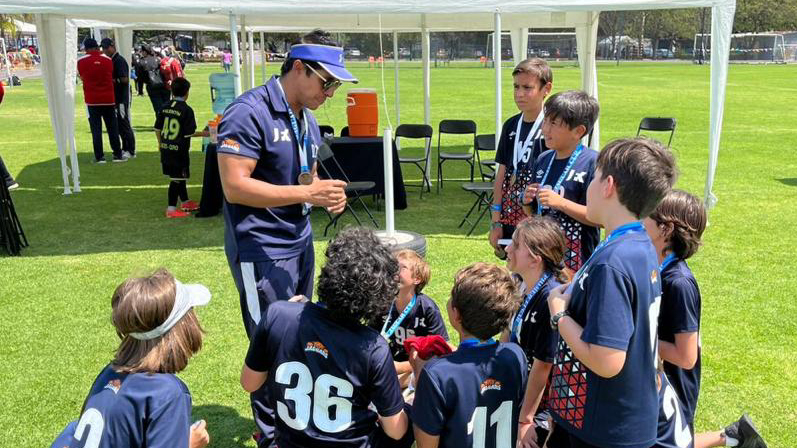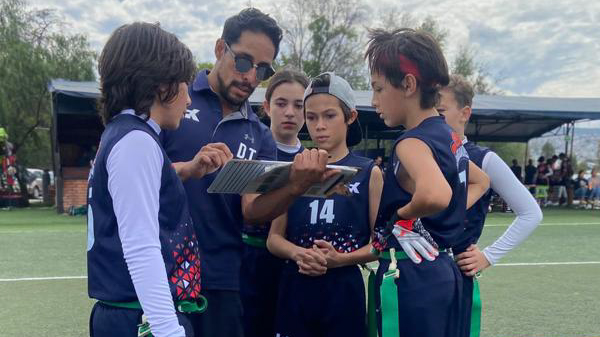David Téllez, Flag Football coach at JFK, discovered his passion for the sport while playing football at a time when flag football was not yet recognized as a formal discipline. His first experience as a coach occurred during his university years, when he led a team of 5- and 6-year-old children. This experience marked a turning point in his life. “It was a significant challenge to get the kids to focus and start developing the skills needed for flag football. From that moment on, I really enjoyed it because it’s a faster, more dynamic game, and kids feel safer since there’s no physical contact,” David recalls.
Over the years, David has enhanced his coaching skills by earning various certifications. Among the most notable are his specializations in direction changes, absolute speed, team training, fundamentals of flag football through EXOS, and a flag football certification accredited by SEP.
His coaching career spans more than 12 years. It began during his university service requirement, where he was tasked with coaching football teams. In the realm of flag football, he has nearly a decade of experience. His career includes a stint at UVM, where he coached youth teams, and at Cimarrones, a club in Querétaro, where he worked with teams across different categories, including youth, intermediate, and women’s teams in both flag and equipped football. Later, his passion and dedication took him to the University of Arkansas, where he founded and developed the flag football program over four years.
What David enjoys most about his role as a coach is the positive impact he can have on his players’ lives. For him, being a coach is not just about teaching sports skills but also about being a role model, promoting values, and helping young people grow into well-rounded individuals. His goal is to leave a lasting mark on the children by equipping them with tools to grow both on and off the field.
At JFK, where he has been a coach for three years, David feels a special connection with his students. For him, the energy and spontaneity of the kids make every day unique. “There’s always a child who brightens your day with a comment, a joke, or simply their enthusiasm when they greet you,” he shares.
David emphasizes the importance of sports as a complement to academic development. In his experience, activities like flag football not only improve physical abilities such as agility, speed, and coordination but also foster leadership, quick decision-making, and resilience. These qualities, he asserts, are essential for tackling challenges both on the field and in daily life.
This week, David is leading JFK’s teams in the ASOMEX tournament, one of the most important events on the sports calendar. Although winning is an important goal, David stresses that his primary objective is for the students to have an unforgettable experience. He wants them to remember the tournament not only for the results but also for the camaraderie and special moments shared with their teammates.
In addition to competing, David has worked tirelessly to establish and strengthen the flag football categories at JFK, which now total five. His current focus is on developing a more dynamic technical system, shifting from strategies centered on running plays to greater proficiency in passing. This change is already showing results, particularly in the U10 categories.
To students considering joining the team, David encourages them to give flag football a try. He explains that the sport is much more agile and fast-paced than football and that, since most youth categories are co-ed, it fosters constant interaction among teammates, “creating friendships that last a lifetime,” he concludes.
Meet the Jaguars: David Téllez, Flag Football
David Téllez, coach de Tocho bandera en JFK, descubrió su pasión por este deporte mientras jugaba futbol americano, en una época en la que el tocho bandera aún no era reconocido como una disciplina formal. Su primer acercamiento como entrenador ocurrió durante su etapa universitaria, cuando dirigió a un equipo de niños de 5 y 6 años. Esta experiencia marcó un antes y un después en su vida “porque fue un reto muy importante lograr que los niños pusieran atención y empezaran a desarrollar las habilidades para el tocho, y desde ahí me gustó bastante porque es un juego un poco más dinámico, más rápido, y los niños se sienten más seguros al no haber contacto físico”, cuenta David.
Con el paso de los años, David ha fortalecido su formación como entrenador al obtener diversas certificaciones. Entre las más destacadas están sus especializaciones en cambios de dirección, velocidad absoluta, entrenamiento de equipos, fundamentos de flag football por EXOS y una certificación en flag football avalada por la SEP.
Su trayectoria como entrenador abarca más de 12 años. Comenzó mientras realizaba su servicio social en la universidad, donde se le asignó la tarea de entrenar equipos de futbol americano. En el ámbito del flag football, acumula cerca de 10 años de experiencia. Su carrera incluye etapas en la UVM, donde entrenó equipos infantiles, y en Cimarrones, un club en Querétaro, donde trabajó con equipos de diferentes categorías, incluyendo infantiles, intermedios y femeniles, tanto en flag como en futbol americano equipado. Posteriormente, su pasión y compromiso lo llevaron a la Universidad de Arkansas, donde fundó y desarrolló el programa de flag football durante cuatro años.
Lo que más disfruta David de su rol como entrenador es el impacto positivo que puede generar en la vida de sus jugadores. Para él, ser coach no solo implica enseñar habilidades deportivas, sino también convertirse en un modelo a seguir, promoviendo valores y ayudando a los jóvenes a desarrollarse como personas íntegras. Su meta es dejar una huella en los niños, brindándoles herramientas para crecer tanto dentro como fuera del campo.
En JFK, donde lleva tres años como entrenador, David encuentra una conexión especial con sus alumnos. Para él, la energía y las ocurrencias de los niños hacen que cada día sea único. “Siempre hay un niño que te alegra el día con un comentario, una broma o simplemente con su entusiasmo al saludarte”, comenta.
David enfatiza la importancia del deporte como complemento de la formación académica. En su experiencia, actividades como el flag football no solo mejoran habilidades físicas como agilidad, velocidad y coordinación, sino que también fomentan el liderazgo, la toma de decisiones rápidas y la resiliencia. Estas cualidades, asegura, son esenciales para enfrentar los desafíos tanto en el campo como en la vida diaria.
Esta semana, David lidera a los equipos de JFK en el torneo ASOMEX, uno de los eventos más importantes del calendario deportivo. Aunque ganar es una meta importante, David subraya que su principal objetivo es que los alumnos vivan una experiencia inolvidable. Quiere que recuerden el torneo no solo por los resultados, sino por la camaradería y los momentos especiales compartidos con sus compañeros.
Además de competir, David ha trabajado arduamente en la consolidación de las categorías de flag football en JFK, que ahora suman cinco. Su enfoque actual está en desarrollar un sistema técnico más dinámico, pasando de estrategias centradas en el juego terrestre a una mayor habilidad en los pases. Este cambio ya está rindiendo frutos, especialmente en las categorías U10.
A los alumnos que consideran unirse al equipo, David los invita a probar el flag football. Explica que este deporte es mucho más ágil y rápido que el futbol americano y que, al ser mixto en la mayoría de las categorías infantiles, fomenta una interacción constante entre compañeros, “creando amistades que duran toda la vida” concluye.




